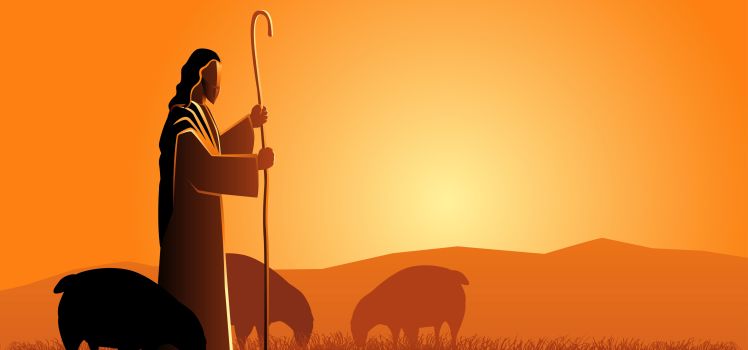
Hello everyone,
Welcome to the latest issue of our church newsletter. Our newsletter is sent out regularly to share reflections from services, Bible readings and church news to our church family. You can find previous issues on our church website here.
We would love to hear from you and are always looking for uplifting and encouraging content to share in future issues of this newsletter. If you have any ideas or content that we can share, please do email them to Louise (publicity@christchurchuxbridge.org.uk)
Opening Prayer
As I come to you today, may I centre myself on you again, O God.
Help me to turn aside from the busy-ness and business of the day,
to meet with you again in this space.
Come here, Holy and remarkable God,
By your Spirit I pray.
Amen.
(Taken from The Vine)
Reflection from 21 April
Readings – Psalm 23, Ezekiel 34: 1-10, John 10: 11-18 and 1 John 3: 16-24
So, I have a four-part reflection that we’re going to think about. In the Gospel reading we see Jesus describing himself as the Good Shepherd; that he loves his sheep so much. Not only that he loves them, to look after them, and he will lay down at the at the gate of the pen at night. If we read back a few verses, in John 10 we get that saying where Jesus says, “I am the gate” and it’s exactly as we were saying earlier about the sheep pen, being the one who lies across the pen to close it, to be the gate in the pen to protect those within it and to keep people out. But more than that, he’s talking about laying down his life and I think he’s foretelling that he will lay down his life in the crucifixion and ultimately allow himself to be killed.
He contrasts himself really with the hired hand. The hired hand is just in it for the money, running away to avoid trouble if there’s trouble to protect himself, and allowing the flock to be sacrificed to run off. Jesus won’t allow that and would sacrifice himself in their place. He brings nourishment, he brings refreshment, he guides the flock and supports those in need, particularly the weaker members of the flock: those who are sick, those who are lame. He guides them and he rescues them and, I think, echoing the words of the psalm as our Good Shepherd for you and I. Even in our darkest places he will be with us, guiding us on the right paths.
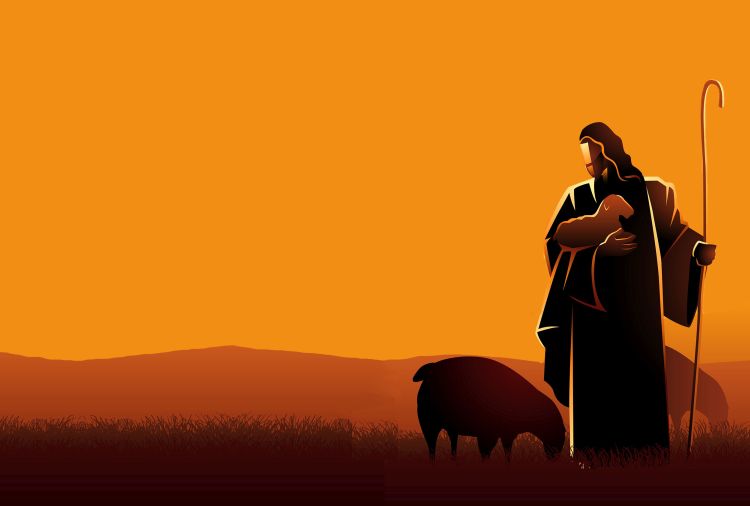
I remember some years ago, Jo and I were going through one of the darkest times in our life, and it amazed me how God was there for me in even in ways that it just seems might have been serendipity but I don’t think it was. The number of times when I was traveling into London to go to work and getting on the Metropolitan line when just the right person would turn up and sit down next to me and chat for half an hour. It actually was often Cathy – not always – but there was a number of people and it just felt like God coincided our lives for that half hour in a most miraculous way. It has happened a lot less since and I don’t sort of need it, I suppose.
We don’t need to be fearful of evil because he will always be with us and then there’s this promise that he’s going to bring us blessing in the face of our enemies. It’s really interesting that Psalm 23 is arguably the most famous Psalm you know. Somehow it connects really deeply with people, both those of faith and those not of faith. It’s very frequently used at funerals, but it’s also become something of a cultural icon. If you think about psalms that appear in films, Psalm 23 appears probably more than any other. In the 1997 film, Titanic, the priest is reading the psalm as the ship is sinking. In the John Wayne film Rooster Cogburn, the female protagonist is reciting the psalm in the face of her attacker. In the 1985 Clint Eastwood film Pale Rider there’s an interplay between hope and and doubting the divine. As a young girl is burying her dog that has been killed by the villains, she recites Psalm 23 but intersperses her own commentary: “I shall not want – but I do want…”, “he restoreth my soul – but they killed my dog…”, “I shall fear no evil – but I am afraid…”, “thy loving kindness and mercy shall follow me – if you exist.”
There’s one film that had a huge impression on me, which was the 1986 film When The Wind Blows, a full length cartoon film, beautifully done, and it recounts a rural English couple’s attempt to survive a nuclear attack and maintained their sense of normality in the subsequent fallout and nuclear winter. Towards the end when they are reaching their demise, Jim Bloggs recites Psalm 23. In the film it’s really poignant. I think it’s incredibly important though that we don’t let the familiarity of these words wear out the meaning of the words for us. I think we need to take them to heart even though they become so very familiar.
While we’re thinking about 1980s films, on a personal level it is it is the decade when I met my beloved and I recall marriage lessons from years ago in the 1980s. Jo and I came from a church that took weddings and marriage really seriously and actually would encourage you to a series of lessons to prepare for and teach you things. Curiously one of the lessons that we really learned was summarised in the lyrics of the 1998 song Teardrop by Massive Attack. Massive Attack was an English trip hop collective from Bristol but that lesson was love is a verb. Love is a doing word. Not a feeling, not a state of mind, not something to fall into or out of, but a thing to do, an action.
In the letter from John, which we listened to, it talks about how Jesus laid down his life for us and we ought to lay down our lives for others, for our brothers and sisters:
“If anyone has material possessions and sees a brother and sister in need, but has no pity on them how can love be in that person, for love is not words or speech, but it is actions and truth.”
I think we need to hold ourselves to that measure. The extent to which we do acts of love for one another and for others is the extent of which God’s love is in us; this, not our fancy words, our fancy rhetoric and our beautiful meetings, it’s that doing, that action, that being there for each other, sharing with those in need, showing love in actions and in truth.
So to the third part, Ezekiel. Often parables have layers of meaning, and I think it is absolutely the case with this one as Jesus says I am the Good Shepherd. I don’t think he was just telling a story, I think he was think he was being provocative and hence the rather provocative image. The Old Testament reading from Ezekiel that we had today would have been well known at that time. The religious leaders would have known it, the people he was talking to would have known it, so I don’t think this is just a nice parable about looking after sheep, but I think it’s a Messianic claim. Jesus was claiming to be the one sent and it was also a rebuke. I think he was strongly rebuking the religious leaders of the time he was speaking to.
In claiming to be the Good Shepherd he was putting himself into that Old Testament prophecy and pretty clearly telling the religious leaders that they were the Shepherds of Israel to whom Ezekiel says, “woe to you Shepherds of Israel, you eat the food, clothe yourselves and slaughter the best animals. You don’t care for the flock, you don’t strengthen the weak, the sick, or the injured, you don’t rescue the strays, you ruled them harshly and brutally.”
The Old Testament writers often used the notion of a shepherd as a kind of shorthand for a civil or religious leader so this rebuke to the leaders in that time around Jerusalem around Israel is a remarkably stark rebuke to them and the consequences of that prophetic judgment that Jesus was telling the religious leaders of that day is: I, Jesus, will be the Sovereign Lord and I’m against you. I will hold you accountable for the flock. I will remove the flock from you and tend the flock so that you can’t feed yourselves with them, which is actually bringing poverty on them as well as disempowering them. It’s a threat of financial ruin, taking the flock away, so he was declaring a rebuke and a takeover.
Finally, I want to think about that very enigmatic line in verse 16 of the Gospel reading. Jesus said, “I have sheep that are not of the sheep pen” and promised that they were going to be brought into the fold too. What do we make of this? I’ve often kind of pondered what does this mean and maybe the most obvious meaning is that Jesus was also referring to the Gentiles, those who were not of the Jewish faith, but I think it’s a little bit more than that. I think we can read it in a more generalised way, that he came for those who are not like us; he came for the others.
Isn’t it interesting that we often define ourselves by those that we are like. When you were at school there was probably an in-crowd and there were outsiders or others. We see it today in social media wars where there are those who agree and others who are wrong, and we see it rather tragically in in the kind of political campaigning – the them and us narrative or us versus the others. We’ve got this narrative at the moment about the immigrants who come illegally in their boats and take our jobs and only on Friday I was reading what the Prime Minister said, and if this isn’t me making a political point this is me referencing the language change that’s happening in the political discourse. On Friday our prime minister was describing what he called the UK sick-note culture where benefits have become a lifestyle choice for some others causing a spiralling welfare bill. It sounds really rather like othering the benefit claimant in a way that is very them and us.
This blaming of others or scapegoating is actually a really profound mechanism. When a group blames and expels the scapegoat, it brings unity within the group in an almost religious way. It brings peace within the group. This is a mechanism to bring social peace by identifying a scapegoat, blaming them and expelling them. It works for a while and then another scapegoat is needed, and somebody else is othered, and somebody else is expelled and the cycle repeats.
Jesus broke this mechanism. He was persecuted, blamed of some fault, and executed. Even the disciples got wrapped up into the scapegoating mechanism and the collective pressure to abandon Jesus. Remember that the disciples became part of the scapegoating crowd: Peter’s denial of Jesus, joining in with them, not wanting to be othered like Jesus at that time.
Whereas humanity has achieved some sort of temporary social peace by performing these violent acts of scapegoating, Jesus’s solution is much more radical, much more efficient and much more permanent. He turned the other cheek and abstained from retribution and more than that he brought love to those that were othered, specifically love to the outcasts, love to those our society excludes, and so this is God’s command that we believe in the name of his son Jesus and love one another as he commanded us to love; those that are in the in group, but also to love the others.
Neil Mackin
Readings for 28 April
John 15: 9-17
9 “As the Father has loved me, so have I loved you. Now remain in my love. 10 If you keep my commands, you will remain in my love, just as I have kept my Father’s commands and remain in his love. 11 I have told you this so that my joy may be in you and that your joy may be complete. 12 My command is this: Love each other as I have loved you. 13 Greater love has no one than this: to lay down one’s life for one’s friends. 14 You are my friends if you do what I command. 15 I no longer call you servants, because a servant does not know his master’s business. Instead, I have called you friends, for everything that I learned from my Father I have made known to you. 16 You did not choose me, but I chose you and appointed you so that you might go and bear fruit—fruit that will last—and so that whatever you ask in my name the Father will give you. 17 This is my command: Love each other.
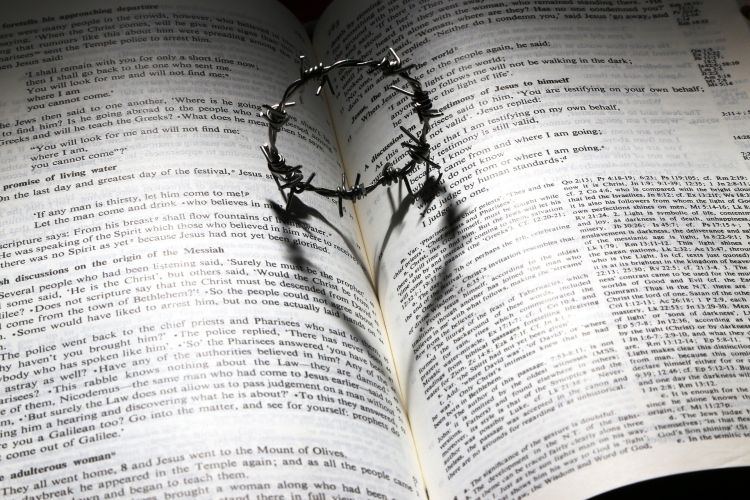
Further readings from the lectionary this week are as follows:
- Psalm 22: 25-31
- Acts 8: 26-40
- 1 John 4: 7-21
Our worship
We meet at 11am for our Sunday services, which are also live-streamed on our YouTube channel. If you wish to view our services online, you can find them at https://www.youtube.com/@christchurchuxbridge
You can also view a recent service on our church website. Our service this week will be a joint service at Ickenham URC at 11am. You can find the order of service here. Please note that there will be no service at Christ Church this Sunday and the service this week will not be streamed online.
If you are unable to join us in person or online for our Sunday services, but would like to receive a recording of them on a memory stick to watch at home, please let us know.
Forthcoming services
28 April – Joint service at Ickenham URC (No service at Christ Church)
5 May – Neil Mackin (Christ Church member and trainee URC lay preacher)
12 May – Christ Church worship group – parade
19 May – Christ Church worship group (Pentecost)
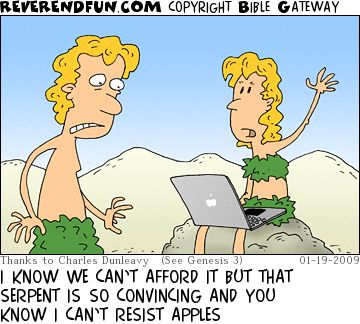
CTU Bible Study
Wednesdays from April 24th to May 29th
13:15 – 14:15 at the Quaker Meeting House, York Road, Uxbridge.
The session on 1 May will focus on Psalms 122 and 123.
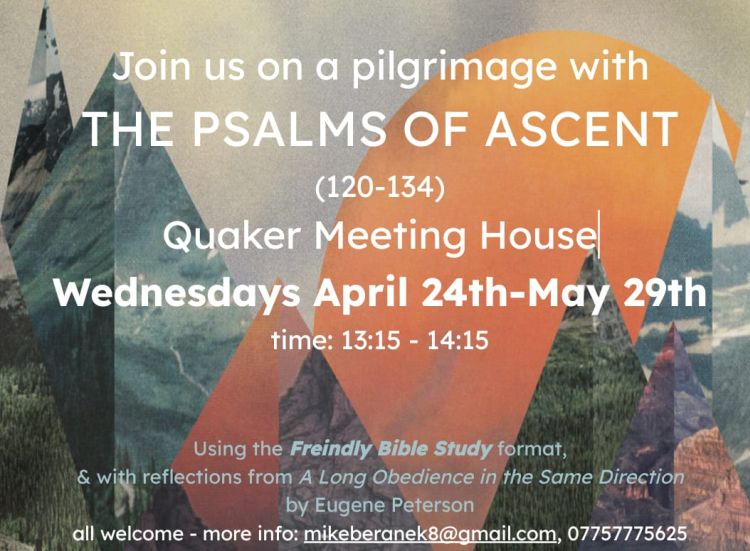
All welcome. For more information, please contact Mike Beranek at mikeberanek8@gmail.com or by telephone on 07757 775625.
Dates for your diary
| 27 April | Preach with a view social event |
| 28 April | Preach with a view joint service at Ickenham |
| Farewell service for Revd Dong Hwan Kim at Ruislip Manor Methodist Church | |
| 1 May | Welcome Wednesday
CTU Bible study group |
| 8 May | CTU Bible study group |
| 15 May | CTU Bible study group |
| 19 May | Congregational Meeting |
| 22 May | CTU Bible study group |
| 29 May | Welcome Wednesday
CTU Bible study group |
| 12 June | Welcome Wednesday |
| 26 June | Welcome Wednesday |
| 10 July | Welcome Wednesday |
| 24 July | Welcome Wednesday |
| 4 September | Welcome Wednesday |
| 8 September | Congregational Meeting |
| 18 September | Welcome Wednesday |
| 24 November | Congregational Meeting |
Children’s Corner
(Based on Acts 8.26-40)
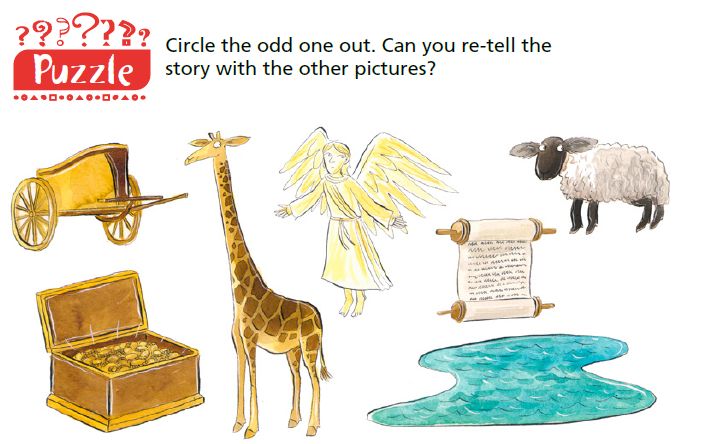
Praying for other churches
This week we hold Trinity, Harrow (URC/Methodist) in our prayers.
Closing prayer
This is the day that the Lord has made,
As you go out into the remainder of this day, and the week ahead,
May you experience the Creator God, the Christ-light and the Holy Spirit at work.
Amen.
(Taken from The Vine)
